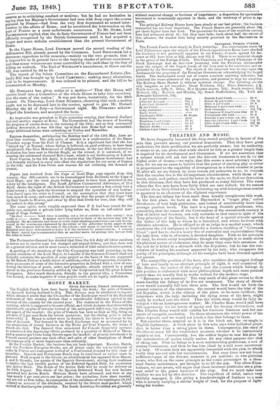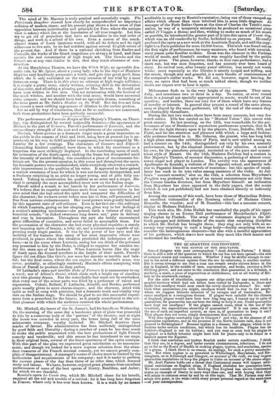THEATRES AND MUSIC.
We have frequently lamented the deep-rooted prejudice in favour of five acts that prevails among our poetical dramatists. That they have great authorities for their predilection we are perfectly aware; but no authority, it seems to us, can prove that a tale should be told at a greater length than is required for its development and illustration. If we are answered, that a subject which will not fall into the five-act treatment is not fit for the higher order of drama,—we reply, that this seems a most arbitrary regula- tion, for we see no cause to believe that the power of exciting pity or terror is proportioned to the capability of arrangement in a fixed number of parts. If, after all, we are forced, by some reason yet unknown to us, to concede that the number five is the all-important consideration, while those of in- terest, truth, and pathos, stand far lower in the scale, we find our dramatists in this dilemma, that they have but produced so many failures. The cases where the five acts have been fairly filled are rare indeed; for we cannot consider them fairly filled when the bolstering-up with heterogeneous matter is apparent to an observer of the slightest experience.
The five-act fallacy has been more than usually conspicuous this week. In the first place, we have at the Haymarket a " tragic play," called Strathmore, of very high pretension, and iudeed of considerably more than average poetical merit. The hero is a young Scottish gentleman, who, conceiving that the cause of the Covenanters of the seventeenth century is that of justice and freedom, not only embarks in that cause in spite of the Tory principles of his family, but is the head of a special crusade against the father of the lady to whom he is betrothed, and whom he loves with chivalric adoration. He is obliged to sit as judge in a martial court, which condemns the old malignant to death for a wanton shedding of " Covenant blood "; and has to stand a heavy fire of entreaties and expostulations from his lady-love, who is, of course, a devoted daughter. Firm to his principle of duty, he resists every temptation; though the struggle is so much above his physical power of endurance, that he more than once falls senseless. At the end he is killed in a skirmish with the Royalists; but he has the con- solation of hearing his conduct approved by his lady, who recognizes the purity of his principles, although all his energies have been directed against her parent.
The martyrlike position of the hero, who sacrifices the strongest feelings of love and family to an abstract principle of right, is well conceived by Mr. Marston, the author of this play; and the contest which belongs to this position is elaborated with more philosophical depth and more poetical power than we usually find in works written for the modern stage.
" Revenons is nos moutons." The very merit of this piece serves to show more forcibly the fallacy of its five-act treatment. The story of Strath- more would naturally fall into three acts. The first would set forth the general relation of the characters; the second would have the trial of the old Royalist, which is the climax of the piece, as its main incident; the interviews with the lady, including the dying scene of the hero, might easily be worked into the third. Thus the whole story would be fully de- veloped without heterogeneous matter; Mr. Charles Kean would still have full opportunity for his bursts of agony and his dreamy abstractions, and Mrs. Charles Kean would still exhibit her feminine fondness and her mo- ments of energetic resolution. On these characters the whole power of the piece depends, and we would not touch a line that belongs to them. But number three, magical as it is in the black art, has no magic in English legitimacy. A weak piece in five acts, says time-hallowed preju- dice, is better than a strong piece in three. Consequently, the story of Strathmore must fill the established measure, whether it be intrinsically capable or not. Consequently, ton, the author begins to mar his plan by the introduction of matter totally useless for any other purpose save that of eking out. First lie brings in a most uninteresting gentleman, a sort of untrue Covenanter, and then he has him jilted by a still more uniutereat- lug lady. Of course they are apparently connected with the plot, to which really they are not aids but incutnbrances. But even these are not found sufficient—part of the five-act measure is yet unfilled; so two plebeian lovers, who flirt on the same principle as the comic personages in a thou- sand Surrey melodrames, are brought in to fill the gap. The ultra-Eliza- bethans, we are aware, will argue that these facetious platitudes are a plea- sant relief to the grave business of the play. But we must take care whither we are led by this doctrine. The expedient of relief, unless very skilfully managed, is like giving a hundredweight of feathers to a man who is already carrying a similar weight of lead, for the purpose of light- ening his burden.
The mind of Mr. Marston is truly poetical and essentially tragic. The Patrician's Daughter showed how clearly he comprehended an important collision of modern times; and his present play shows a keen sense of that opposition between individuality and principle (or Fate, where the antique view is taken) which lies at the foundation of all true tragedy. Let him try to get rid of prejudices that have no foundation in the real order of things, and work in a school of his own. Even a course of the much- abused drama of Louis Quatorze would, with all its defects and its rigid adherence to five acts, be no bad antidote against several English errors of the present day. And if there be a national shrinking from Racine and Corneille, the works of the Greek tragedians are always at hand, and these contain the real counterpoint of high tragic art. The Greeks and the French are at any rate similar in this, that they teach closeness of con- struction.
At the Marylebone Theatre, we have the Witch Wife- as agreeable dra- matic tale, by Mr. Spicer, about a young lady, who in the days of Matthew Hopkins very heedlessly personates a witch, and gets into great peril, from which she is only extricated on the very occasion of her trial by a most fortunate coup. There is in this piece no attempt at high tragic collision; it is simply a pretty story, nicely written, evincing skill in the delineation of character, and affording a pleasing part for Mrs. Mowatt. It should not have been written in five acts. One act terminating with the festival of the mock witches, and another with the trial scene, would have answered every purpose; and we should have had an agreeable drama, something of the same genre as Mr. Serle's Shadow on the Wall. But the five-act form has caused a most striking appearance of dilution in the earlier portion.
Let us add by way of conclusion, that as far as audiences are concerned, both these productions have been perfectly successful.



























 Previous page
Previous page